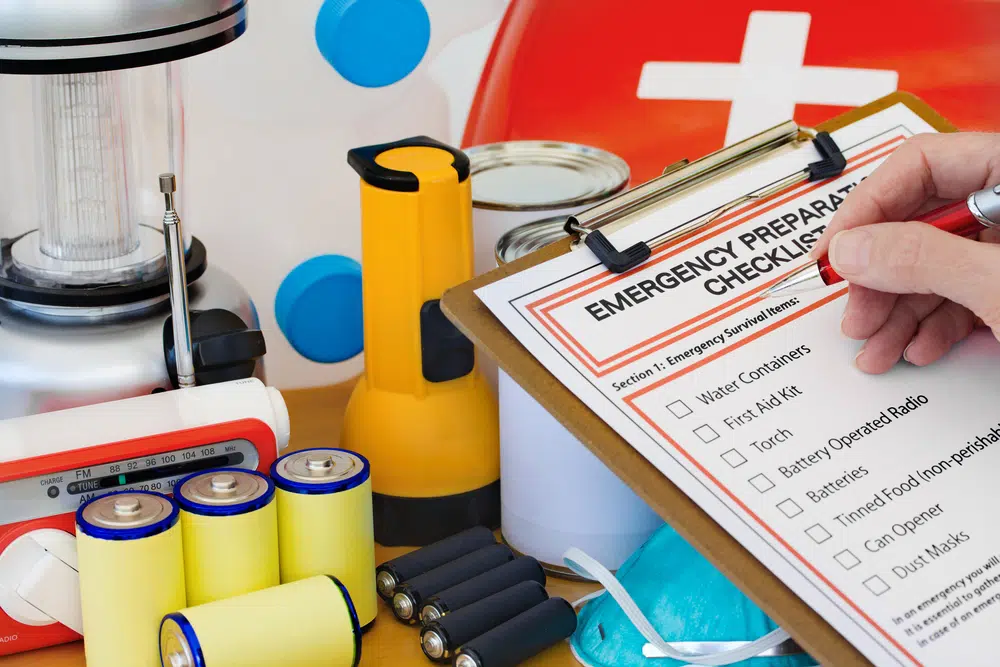Identity Safe When Disaster Strikes
Home Help Center Identity Safe When Disaster Strikes

Natural disasters and large-scale emergencies are part of our reality, no matter how much we wish that weren’t true. Since you cannot prevent the next earthquake, wildfire, or hurricane, you can make sure you have a plan to be identity safe for when a disaster strikes. While other knowledgeable sources will help you determine how much clean water or prescription medications you need to store, the Identity Theft Resource Center wants you to plan for a different emergency aspect: identity theft protection and fraud prevention during events like these.
Scammers Prey During Vulnerable Times
Identity theft is a threat when any disaster strikes. After a natural disaster, documents may be accessible to looters who can steal them and commit identity theft with your personal information. The National Center for Disaster Fraud (NCDF) was created in 2005 to improve and further the detection, prevention, investigation and prosecution of fraud related to natural and human-made disasters, and to advocate for the victims of such fraud. Since their creation, they have had over 100,000 disaster fraud complaints.
Make a Plan
September is National Preparedness Month, and the Federal Trade Commission urges all people to make a plan. In any emergency, you may have to prove your identity while also being cut off from access to your important papers. During the aftermath of a dangerous event, you may need to be able to access your funds and deal with insurance agents, contractors, maintenance specialists and more.
Secure and Access Your Documents and Funds
Your personal papers can play a strange role during a crisis. They are both proof that you are who you say you are, but they are also a hot commodity for scams, fraud and theft. Keep them protected at all times, be able to access them in a crisis, but do not let them fall into the wrong hands. Remember, if you’re evacuating in a sudden emergency like a house fire or flash flood, your documents are not necessary for receiving medical care, emergency housing or other basic needs.
However, there will be instances where you need to provide some proof. When planning your emergency supplies, consider including a small, password-protected flash drive that holds pictures of critical documents to keep yourself identity safe. You will not endanger your originals—or leave them stored unsafely when not needed—but you can call them up when the emergency has passed.
For every other time, make sure you secure your papers from harm and theft in a safe deposit box, home fire safe or another protected place. As part of any preparedness plan, you need to know how you will get to your money and your insurance documents if you need them. Emergency medical services should be provided without documentation or money to those in crisis. Still, if you’re able to provide things like medical insurance cards for less serious issues, it might be helpful. To stay identity safe, place your expired medical insurance cards in your preparedness items. That way, the hospital will at least have the information they need to contact your provider and verify your current coverage. To be prepared, make sure your documents are always stored together in a safe place. If you need access to them, you can grab the entire bundle of birth certificates, marriage certificates, property deeds, Social Security cards and more. If a disaster separates you permanently from your important papers, contact the proper authorities as soon as it’s safe and feasible to do so.
Beware of Scams
Scammers and fraudulent individuals use news of significant events as a gateway to target victims with everything from repair scams to fake government handouts. If someone demands your driver’s license or Social Security card before they’re willing to provide assistance, you might be dealing with a scammer. Be careful about who you deal with after an event, and get all price quotes in writing before work begins. If you are unsure or uncomfortable with anyone you encounter, even if they claim to be a state or federal emergency management official, do not give out your personal information. It will keep you identity safe when a disaster strikes.
Contact the Identity Theft Resource Center for toll-free, no-cost assistance at (888) 400-5530. For on-the-go assistance, check out the free ID Theft Help App from ITRC.
How much information are you putting out there? It’s probably too much. To help you stop sharing Too Much Information, sign up for the In the Loop.
Get ID Theft News
Stay informed with alerts, newsletters, and notifications from the Identity Theft Resource Center

